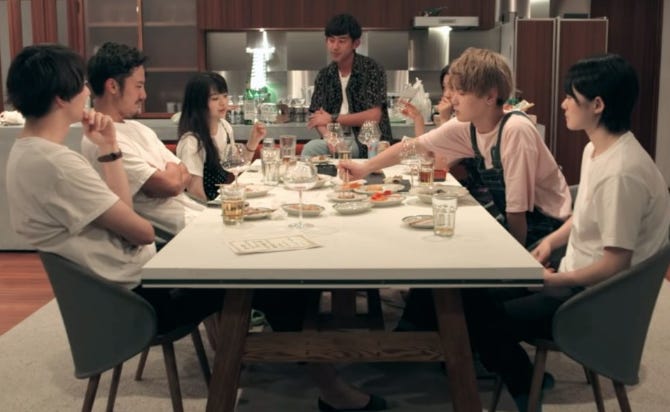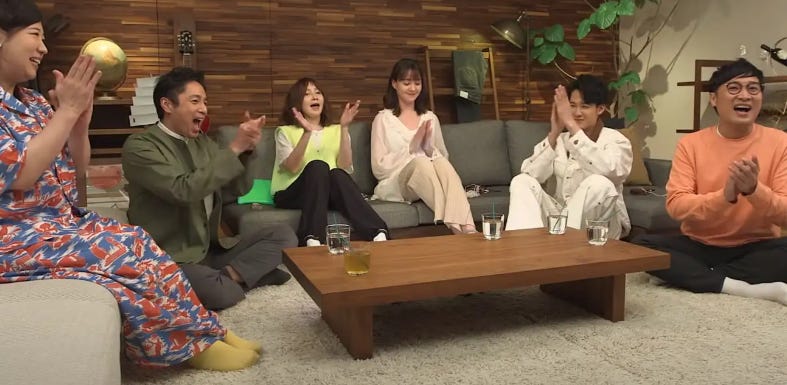Reality TV shows with love-finding themes have always made me roll my eyes. Despite its massive popularity, I have never watched The Bachelor or The Bachelorette because the premise of people finding true love on camera is a little fake, at least for me.
Well, that perspective changed when I watched Terrace House. I still remember that day in 2018, when I was scrolling Netflix mindlessly and came across a Japanese TV show called Terrace House: Boys and Girls in The City.
I have been watching Japanese variety shows since high school, so I was pleasantly surprised to discover one on Netflix at that time, seeing a shortage of Japanese entertainment selections on subscription channels. I binge-watched the whole show with my husband and the rest, as they say, was history.

OK, the Japanese culture and customs have never ceased to amaze me so I might be hugely biased, but I think even if you are not familiar with Japanese culture, you’ll fall in love with this reality TV show. Terrace House has 5 seasons altogether (with around 40 episodes each season) but I will never forget Boys and Girls in The City for introducing the magic to me.
To summarize the show, Terrace House's premise is gathering six strangers - 3 women and 3 men at a time - to live in a huge house. They go along with their usual day-to-day activities per normal, the only difference is that now they are living with new housemates.
There are students who attend their university classes and go to their part-time jobs, there are some who work in companies from 9 to 5, and there are also a lot of models who often rush to their agencies for photoshoot sessions. There are also freelancers and self-employed members who run their businesses from the house.
It is a wild mix, but most of them have flexible schedules, allowing them to stay at the house and hang out with their housemates a lot more.
As viewers, we follow these housemates having lunch outside, cooking, drinking, dating, hanging out as a group, playing in the pool during summer, etc. We see them with their bedheads and sleepy faces on weekends. We see them drinking warm water in the kitchen while discussing things to do. We watch them going to the grocery stores and cooking together at home for lunch and dinner. We see them washing dishes and cleaning up the house. We follow them to work and see them in their work environment.
Sounds pretty mundane, right? Who wants to see people doing simple, ordinary things we all do every day?
Well, there lies the magic of Terrace House.
A Navel Gazing, Almost Real “Reality TV”
The mundaneness and banality of Terrace House are not unlike real-life experiences we go through every day, albeit portrayed with gorgeous casts and beautiful scenes. It is reality TV, yes, but the realness of the casts, and the absence of affairs and fights are so refreshing.
It is a show about finding love, yes, but the cast never had to compete for prizes or do unnecessary activities just to elicit excitement from viewers. They simply have to live their lives normally, pursue whatever goals they have, and enjoy the moment with their new friends.
There is no set time as well; the cast can leave at any time they want (they endearingly announced that they want to “graduate” or “satsugyo” from Terrace House when they want to leave).
The show also allows viewers to be the temporary “fly on the wall” as we follow the casts in their daily lives. It brings a kind of lowkey excitement to be the hidden third party, seeing the cast having fun, empathizing with their hard work, and listening to their private conversations and dates. I am pretty sure this speaks to the very human nature of wanting to pry on other people’s real thoughts and how they process those thoughts.

Another thing that Terrace House did very well to achieve this effect through subtle filming; cameras, microphones, and wires are completely hidden from the viewers. I’m sure there are tons of cameras in the house and the cast wore microphones all the time to achieve the quality of cinematography in Terrace House. It is almost like watching a well-produced TV show in that sense.
A Bunch of Funny Commentators
A love letter to Terrace House won’t be complete without mentioning its panel of commentators. Six commentators, three men and three women - similar to the number of housemates in Terrace House - sit in the studio, watch the show’s episodes with us, and provide comments on the cast’s actions and conversations.
Three of the commentators are popular comedians in Japan, adding jokes and lightheartedness to the atmosphere. Their main job is to analyze and sometimes, poke fun, at the situations happening in Terrace House. Mind you there was usually little to no drama between the housemates of Terrace House, so the commentators’ ability to bring something to the table to discuss is pretty amazing.

In a way, these commentators are us, the viewers, watching Terrace House together. They help to articulate our thoughts and physically react to things we feel ourselves when we watch the housemates interact with each other. It is a weird satisfaction to me as a viewer, to hear/see my opinions shared by the commentators.
While rarely heard of in the West, the presence of commentators or emcees is pretty common in Asian TV shows. They are important to help set the scene before the introduction of new episodes, break the show into segments, and provide the necessary comments and jokes. Terrace House commentators are hilarious, and I especially liked the easy banter between Yoshimi Tokui and You.
Catching A Glimpse of Real Japanese Culture
For Japanophiles like myself, Terrace House provides a fresh breath of air. You see, for many years, Japanese TV shows have often been referred to as over-the-top, exaggerated game shows whose sole aim is to bring laughter (you might be familiar with Takeshi Castle, Tokyo Friend Park, etc).
While it is true that most Japanese TV shows that are aired outside Japan are like that in nature, I feel like it does not benefit the Japanese entertainment industry to be seen as, erm, weird. My old friends mocked me when I told them I watch Japanese variety shows because to them they paled in comparison to Western entertainment.
Thanks to Netflix, the worldwide audience can now experience a new level of Japanese TV shows. Quite the opposite of the exaggerated colorfulness that older Japanese TV shows often had, Terrace House chooses a quiet calm, almost boring theme for the show.
I noticed that the casts almost always wear muted, neutral colors, bringing in a sense of tranquility, which reflects what the real population in Japan wears most of the time. I love Japanese fashion in general so the way the cast dresses when filmed is so pleasing to my eyes.
Plus, Terrace House showcases the way actual Japanese behave with each other which is a great way to learn the culture. Most Japanese are often polite to a fault and usually avoid confrontation, which results in a delicious subtle drama between the cast from the viewers’ POV.
The Japanese take great lengths to “save face”, which is loosely translated as preserving one’s dignity from humiliation. They usually don’t say directly what’s on their minds but rather will take a somewhat roundabout way to convey their message.
It is a really interesting and fun way to learn about the Japanese culture. The show allows non-Japanese to understand the beautiful culture without having to resort to over-the-top variety shows as references.

Besides Terrace House, there are a lot of Japanese love-themed reality TV shows on subscription channels lately, such as Love Village, Love Is Blind, Real Love, Ainori Love Village, The Future Diary, etc.
While they are all interesting in their ways, I firmly believe that Terrace House is the best love-themed reality TV show. It is a must-watch Japanese TV show in which nothing happens but will keep you hooked for hours on end.
Thank you for reading as always and do share this post with friends and family if you enjoyed it!
Ristina xx
Hey friends!
I intend to write short reviews of books I read and share them with you. I love reading but often struggle to find good book recommendations, so I thought, hey why not share my thoughts with other like-minded readers?
Shelves Upon Shelves is a simple book review for those always looking for good book recommendations but don’t want to flip through thousands of reviews and comments on Goodreads / forums / blogs.
This newsletter will arrive in your inbox every Sunday so subscribe if you’d like to receive small book recommendations to read on the weekends!




